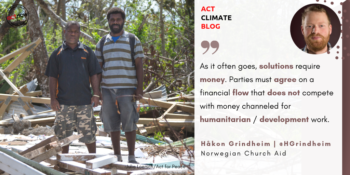We must remember why we are here
Hearing the crowds in the corridors of the UN building in Bonn talk in technical terms, using words like ‘grant equivalent’, ‘IPCC’, ‘response measures’ and ‘market mechanisms’, it can be easy to get lost in the technical talk and forget to discuss the reason behind what brings us all here.
We are in Bonn because there is a growing population of climate-vulnerable people around the world fighting for their survival.
We are here because 45 million people are currently affected by severe drought in Eastern and Southern Africa and 40 million are affected by floods in Southeast Asia. We are here because of the aftermath of the wildfires in California and that of Cyclone Idai and Kenneth which ravaged parts of Southern Africa. We are here because of the heatwaves affecting India, and disappearing ice in the Arctic which is melting beneath our feet.
The solutions to these deadly effects are often technical, thus, talking about the technical terms is important. Loss and damage (which refers to the impacts of climate change, which cannot be adapted to) is a key term which will be discussed during the second week of the climate talks. This term is a sensitive topic for some parties. It is unfair that while the world’s wealthiest countries which have primarily contributed to climate change, it is the poorest that are hardest hit by increased droughts, floods and storms. So the question at play here is who has the responsibility to pay for the losses and damages that developing countries are suffering? A looming question on this trajectory is who will carry the financial burden should the Maldives, for example, have to relocate all their inhabitants before their islands sink?
Are the polluters really paying? This will be a critical question during the second week in Bonn. We urge all countries to engage in constructive discussions on this matter and to find solutions that will save lives.
As it often goes, solutions require money and this is where parties have difficulties reaching an agreement. It is important that parties agree on a financial flow which does not compete with the money that is channelled to other humanitarian work. Not all humanitarian disasters are directly linked to climate change, and so it is vital that developed countries continue to provide support for them.
Instead, the money should be new and additional, in that it should not be taken from existing humanitarian and development flows. This is especially important when it comes to slow onset disasters, which do not receive much attention. For example, an arid region that is slowly getting drier or an island that is slowly sinking as the sea level rises, both lead to potentially deadly impacts, yet do not receive adequate support.
To answer questions similar to those posed in this piece is one reason why country representatives are in Bonn. It is crucial that parties remember the reasons behind why they are in Bonn and that they ACT on it. The world needs to agree on a way forward for loss and damage finance. People depend on it.
 Blog written by Håkon Grindheim, Climate advisor at Norwegian Church Aid.
Blog written by Håkon Grindheim, Climate advisor at Norwegian Church Aid.